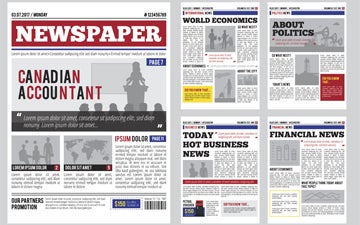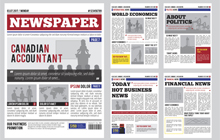Sunday News Roundup 24.09.22: NDP backs off carbon tax, free trade disaster, and more Canadian accounting news

Wrapping up the odds and ends from the past week in Canadian accounting news
Subscribe to our weekly newsletter and get all the week’s stories. Click here to sign up.
TORONTO, Sept. 22, 2024 – In a sign that Pierre Poilievre’s “axe the tax” message continues to resonate, NDP leaders Jagmeet Singh and David Eby have backed away from their previous support of the Liberals’ carbon-pricing policy. The federal NDP says it wants an approach that puts the burden on “big polluters” rather than “working people.” The BC NDP, under pressure in a close provincial election, says it will end its consumer carbon tax — which has been in place for almost two decades — and shift the burden to “big polluters” as well.
The Globe and Mail, however, pointed out this week that lower-income households are “clear beneficiaries under the Liberal’s carbon tax” and it’s the highest-income households “who do indeed, on average, bear a net cost.”
The Globe’s editorial is interesting. After recently clarifying its position on climate change, it puts the financial burden of GHG reduction squarely on the shoulders of individuals rather than business, by focusing on emissions from transportation. Not only does it practically ignore the culpability of the oil and gas sector — the largest single source of carbon emissions in Canada — it fails to acknowledge that Canada is the third largest oil exporter in the world.
Meanwhile, the fall session of Parliament has begun, with the NDP and the Bloc Québécois (both of whom won recent byelections) showing no interest whatsoever in supporting the Conservatives forcing a "carbon tax election." As CBC’s At Issue panel pointed out, the only leader interested at the present time in bringing down the government is Pierre Poilievre. The other party leaders not only dislike him intensely but have rational reasons for keeping the Liberals in power ... for now.
And now, on to the rest of the news from the past week in Canadian accounting.
PwC tightens screws on employees amidst China fallout
The PricewaterhouseCoopers brand has been getting its share of bad press recently. First came the news earlier this month that China hit PwC's auditing unit in mainland China with a six-month business suspension and a record fine of 441 million yuan over its audit of Evergrande. The Big Four, according to Reuters, audit 18 of China's 20 biggest state-owned companies by assets, in the second largest economy in the world.
Apparently access to the lucrative Chinese market is too tempting to pass up. Even as Hong Kong has announced it will proceed with its separate investigation into the PwC Evergrande audit, the firm is investing in 'high quality' business in China after its record fine. Meanwhile, the network’s head office in the United Kingdom says it will require employees to spend more time in the office, and track employees' location while at work.
While the CTV report may imply the practice is occurring in Canada, there is no confirmation from PwC Canada that the practice will be used in Canada, only a discussion of the legality of said practice. All in all, however, not the greatest recruitment message for those graduating from universities and colleges.
Accounting Dealbook
Homegrown national accounting firm MNP continues its march of consolidation in the Canadian accounting profession. September isn’t even over yet and the firm has picked up three more public practices. First came its acquisition of Pierre Thibault CPA inc., and Guy Provost CPA inc., two firms in the Sainte-Julie region of Quebec. (Sainte-Julie is an off-island suburb of Montreal and the two firms will add to MNP’s huge presence in la belle province.)
Two days later, MNP announced it was acquiring EPR Bathurst / Péninsule, which has offices in the towns of Bathurst, Caraquet and Shippagan, on the Acadian Peninsula of New Brunswick. One might argue that this continues MNP’s growing market share of professional services in Francophone regions of Canada, whether in Quebec or beyond. Quite a feat for a firm based in Alberta.
Accounting Software News
Software is not something we normally associate with South Africa. Accounting software giant Xero, however, is buying Syft Analytics, which is based in Johannesburg, for US$70 million. Apparently the company came out of the pandemic strongly, bootstrapping its operation, according to Launch Base Africa:
“With remote working and virtual communication becoming the new normal, Syft’s cloud-based analytics software, designed primarily for accountants and small businesses, found a receptive audience in markets as far-reaching as New Zealand and Canada.” Great news for Canadian accountants and South Africa.
Speaking of Xero, the company just came out with its latest state of the industry report, Leveraging the App Advantage. According to the report, more Canadian practice owners are adapting their services to leverage the efficiencies of digital technologies and apps — nine out of 10 practices surveyed reported using apps for the work they do on behalf of small business clients. At the same time, clients are increasingly reliant on advisors for app advice. The majority of practices with a more established and integrated app stack tend to see higher returns: 66% of surveyed practices that use apps for multiple services report an increase in profit per the past 12 months and nearly 80% of respondents who offered app advisory services noted an increase of revenue over the past 12 months.
For Canadian Accountant, it's been fascinating to watch the growth of the app ecosystem in the accounting profession, somewhat akin to the Apple rather than Microsoft model of software platforms. The more robust platforms these days seem to combine the two, as in the case of Syft as part of the Xero ecosystem of accounting software tools.
Economics: Did free trade shaft the middle class?
There was an interesting feature article in the Globe and Mail this past week called How Canada’s middle class got shafted. The author explores why Canadian median family income has barely changed from 1976 levels and argues that Canada has squandered a well-educated and productive workforce.
As usual, the Globe and Mail’s readers missed the point of the article entirely, either bloviating about political leadership or tax policy in the comments section. Most (but not all) paid absolutely no attention to the crucial question and answer at the end of the article:
“So, what happened in the second half of the 1990s that so effectively and systematically moved us down toward a slow decline? The first thing that might come to your mind is the North American free-trade agreement (NAFTA), and you would be correct [emphasis added].” The author comes to the conclusion — rather ironic given the Globe’s full-throated support of free trade ageements over the past decades — that free trade has led to the betrayal of the middle class. But not for the reasons you might expect.
In fact, the author’s own graphs go even further, and are particularly damning. The first precipitous decline to Canadian purchasing power occurred in 1980 — the year of the first Quebec referendum and a global recession — from which Canadian purchasing power has only recently recovered. The second precipitous decline occurred in 1989, the year that the first free trade agreement between the US and Canada came into force. While the author blames our slow but constant decline in innovation on our belief in “The Market,” the “embodiment of a series of decisions to commit ourselves to a very specific economic ideology,” it is clear the root cause of the disastrous decline was free trade.
Quick Hits: Articles of Interest
Canadian
As CPA split looms, CPA Canada pitches membership to Ontario, Quebec members (Canadian Press)
No conflict in handling of B.C. zero-emission grants, says auditor general (Canadian Press)
B.C. auditor-general exonerates accounting firm in grant program (Black Press Media)
Governing body for B.C. accountants ousts former Crown corporation finance chief (The Breaker)
Time for this tax hit on the 'rich' to be put aside for the good of everyone (Financial Post)
Far-right Rebel News not eligible for journalism tax credits, Federal Court rules (CTV News)
Getting a foot in the door: UofGH students network for future placements, dream jobs at the "Big 4" accounting and consulting firms (University of Guelph-Humber)
B.C. school district facing $2.2M deficit due to accounting error (CBC)
International
Editorial: Not every finance major can be an investment banker. We need more accountants. (Chicago Tribune)
Status quo for big accounting firms under threat, O’Neill says (The Mandarin Australia)
What would a second Trump presidency mean for the global economy? (The Conversation)
Businesses that try to come clean about their impact on nature can end up concealing more than they reveal (The Conversation)
By Canadian Accountant staff.





(0) Comments